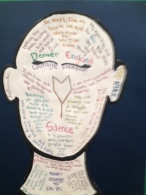“Our lives begin to end the day we become silent about things that matter.” Martin Luther King
I stood in a long line in the women’s restroom during a break in a workshop on assessment with Rick Stiggins. He gently took us, as he said, down into the trough of the despair over assessment and what has happened over the years, with the promise that he would take us back up with ideas for what we could do. I was feeling good that 300 of us in Colorado were hearing a clear sound picture of assessment, an articulation of the problems in what was happening and the beginning of what we could with assessment to support students’ learning and growth.
A woman in a serious suit was holding forth to several people around her, “ The seventies ruined us,” she declaimed. “We are still suffering from ‘I’m okay you’re okay.’” She cited someone from the University of Chicago who agreed with her and then said I was a victim of the seventies education that was just about self esteem.” She kept calling it the ‘I’m okay you’re okay mess.’”
“How terrible is it for us to think we’re okay?” I ached to ask.
In spite of my promise to myself not to confront random people, it hurt my heart too much to just let it go. With what I hoped was a gentle voice, I spoke up. “Yes, we might agree now that true self esteem comes from what you do but I think there were things we learned from the seventies. We were at a certain stage in our understanding and just because it wasn’t adequate doesn’t mean it was nothing.”
She turned her back on me and for the rest of the afternoon wouldn’t see me when I passed her on my rounds as part of the facilitation team. Did I make an enemy of someone who has power at a district? Did I make our team look bad? Do I regret not ignoring her tirade?
It hurt to hear someone say that the era when educators realized they needed to care about how kids felt about themselves ruined us.
The schools in the 60s-80s were not perfect yet there were wonderful stories of kids’ discoveries and enthusiasm. When a primary age class went for a walk in the woods, they got interested in an area of dead fallen trees. They researched and talked about the forest cycles, just as my sister, a naturalist did in her research and wriing. On another walk, the class became fascinated with slugs, especially the silvery transluscent slime trail they leave behind as they move. In their study, a 7 year old boy asked, “We know everything has a purpose for the earth. What is the purpose of slugs?” His classmate quickly answered, “They’re for beauty because of their slime trail.”
What was bad about providing many ways for kids to investigate and communicate about the world they saw? What was bad about kids who were curious about “the first people,” then created that world for themselves at recess?
What is wrong with ending the day with a poem or a teacher reciting Beowulf by heart for the whole school in Middle English every Friday after lunch? What is wrong about extending read aloud time when the kids just had to hear how the book ended and then went on to write their own versions?
At that time, we hadn’t heard about mentor texts so I thought I had stumbled on something pretty interesting and surprising. No one had invented project based learning or gradual release of responsibility or the workshop model. We just stumbled on it as what we observed and listened to kids.
I wish I had been ready to ask that complainer where she thought the now branded best practices came from. Perhaps now I am ready. So watch out if you’re in line with me in a restroom during a break and want to say that kids feeling okay ruined us.
I will remember this quote from Martin Luther King in 1968 as I choose not to be silent.
Yes, if you want to say that I was a drum major, say that I was a drum major for justice; say that I was a drum major for peace; I was a drum major for righteousness. And all of the other shallow things will not matter. I won’t have any money to leave behind. I won’t have the fine and luxurious things of life to leave behind. But I just want to leave a committed life behind. And that’s all I want to say.

